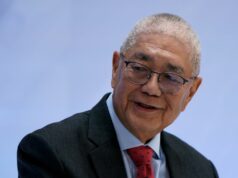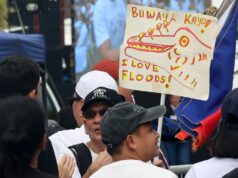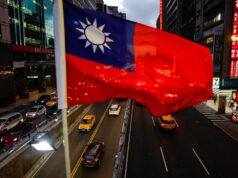Senate holds hearing in Boracay, tackles island’s environmental concerns
By Camille A. Aguinaldo
SENATOR Cynthia A. Villar wants erring businesses closed down while compliant ones remain operational instead of imposing a 60-day total shutdown of business operations in Boracay Island.
“Our suggestion was to close the non-compliant (establishments) while we allow (the) compliant to continue (their) operations. We have to reward those who are complying with the laws and then we punish those who are not complying with the laws,” she said at Friday’s Senate hearing on environmental problems hounding the country’s top tourism destination, which generated P56 billion revenue in 2017.
Ms. Villar heads the Senate committee on natural resources and environment, which, together with the Senate committees on tourism and on finance, held their inquiry right in Boracay.
The Department of Interior and Local Government (DILG) earlier suggested a temporary closure of business operations for 60 days to allow for a speedy clean up on the island.
At the hearing, senators castigated officials of the Department of Environment and Natural Resources (DENR) and local leaders of Aklan for allowing several business establishments to operate without securing the necessary permits from the government.
It was revealed that only 118 of 834 business establishments have permits to discharge wastewater. Some 173 establishments were also currently operating without environmental compliance certificates (ECCs).
DENR Secretary Roy A. Cimatu also testified that five of the nine wetlands of Boracay disappeared after informal settlers and certain establishments have encroached the area.
“Please tell us what went wrong? Who’s at fault? This could not have magically sprouted at night. Somebody must have given the permits. Was it the local government, the planning officers or local DENR?” asked Senator Juan Miguel F. Zubiri.
“We know that this won’t happen if the DENR didn’t neglect its duty. How did the plywood and nails arrive here unless it was allowed by the local government?” Senator Loren B. Legarda said.
DENR Region 6 Director Jim O. Sampulna said he had ordered the provincial environment and natural resources (PEMRO) to issue a cease-and-desist order against erring businesses but no one responded.
“Nobody heeded because the DENR has not teeth to do the job,” he said.
He added that the city environment and natural resources (CEMRO) based in Boracay was abolished in 2013 as part of the agency’s rationalization plan.
Apart from the informal settlers, Aklan’s PEMRO Noel C. Empleo also identified that Seven Seas, D’Mall and Kingfisher were among the establishments located at Boracay’s wetlands.
Asked by senators why building permits were granted to establishments without ECCs, Malay mayor Ceciron S. Cawaling said the DENR document was separate from what the local government has been issued.
However, DILG Officer-in-Charge Eduardo M. Año stressed that the ECC was a vital requirement in securing building permits, especially in Boracay which was already recognized by the government as a protected area.
He added that he has also created a task force to investigate the matter, to formulate guidelines for good local governance as well as to determine accountability to local officials who have been remiss in their tasks.
Mr. Año also said DILG could file charges of negligence, misfeasance and malfeasance against local officials before the Office of Ombudsman after its investigation on Boracay’s environmental situation.
Issued by the DENR, the ECC contains specific measures and conditions that the project proponent has to undertake before and during the operation of a project to mitigate identified environmental impacts.
Mr. Cimatu admitted that the “weakest link” of the DENR was its enforcement of environmental laws.
A bureau was recently organized on his watch with enforcement capability.
Department of Tourism (DoT) Secretary Wanda Corazon Tulfo-Teo called for legislation which would allow the agency to intervene in tourism activities in the island.
She said the DoT lost its authority over tourist destinations after the Local Government Code devolved tourism development to local government units, adding that their functions were limited now to coordination and promotion.
Mr. Zubiri pushed for the creation of a Boracay Development Authority that would oversee the economic and tourism activities of the island.
“It’s a long time coming. If there’s SBMA (Subic Bay Metropolitan Authority) and Clark Development Authority, we need the Boracay Development Authority to step in,” he said, noting that local officials could no longer control the environmental issues in the island.



